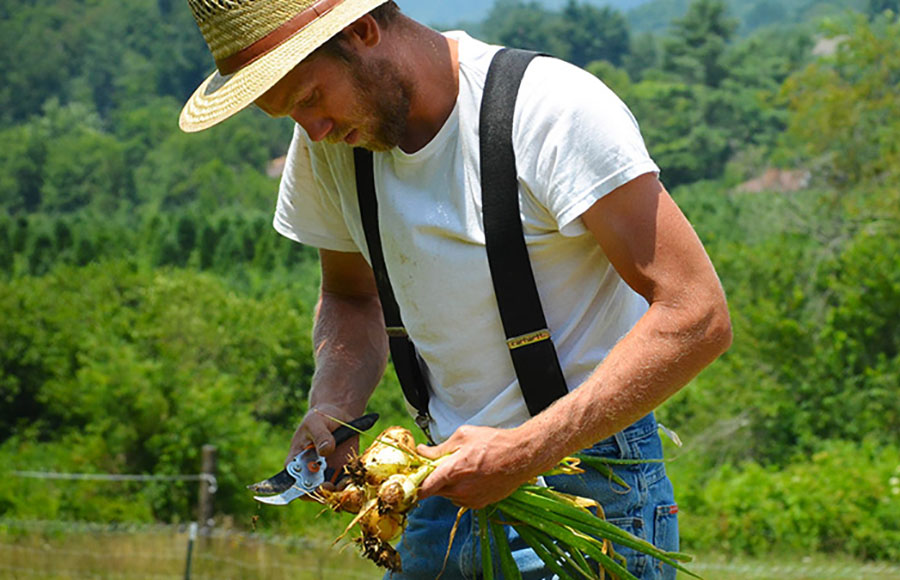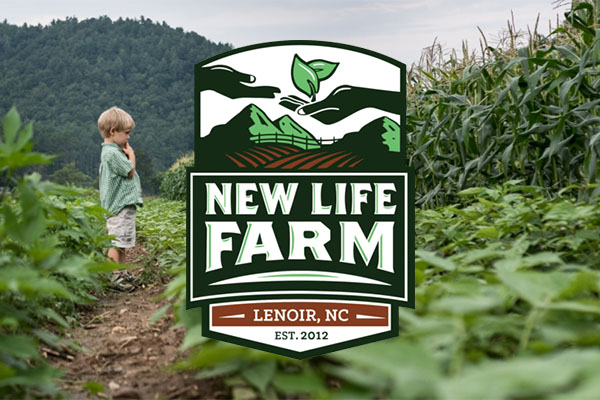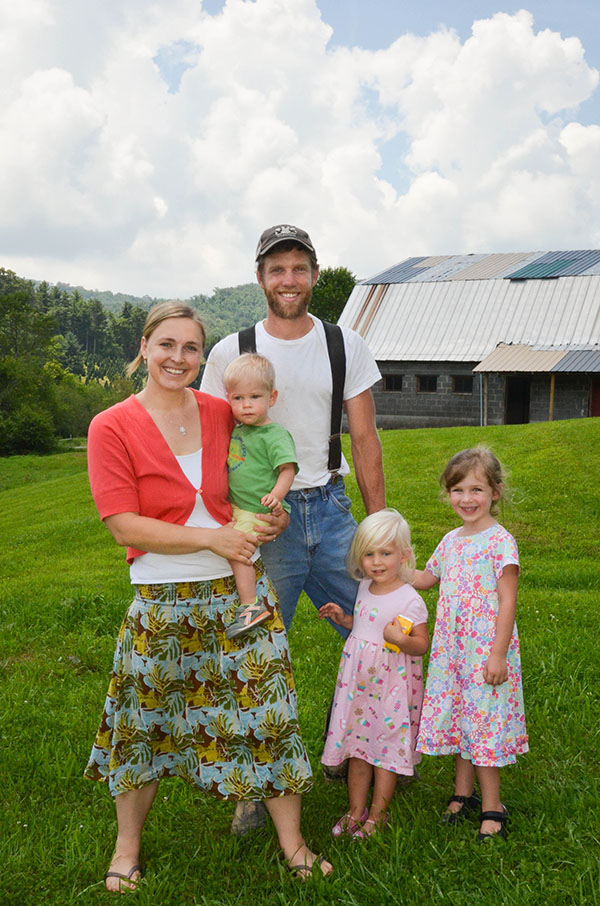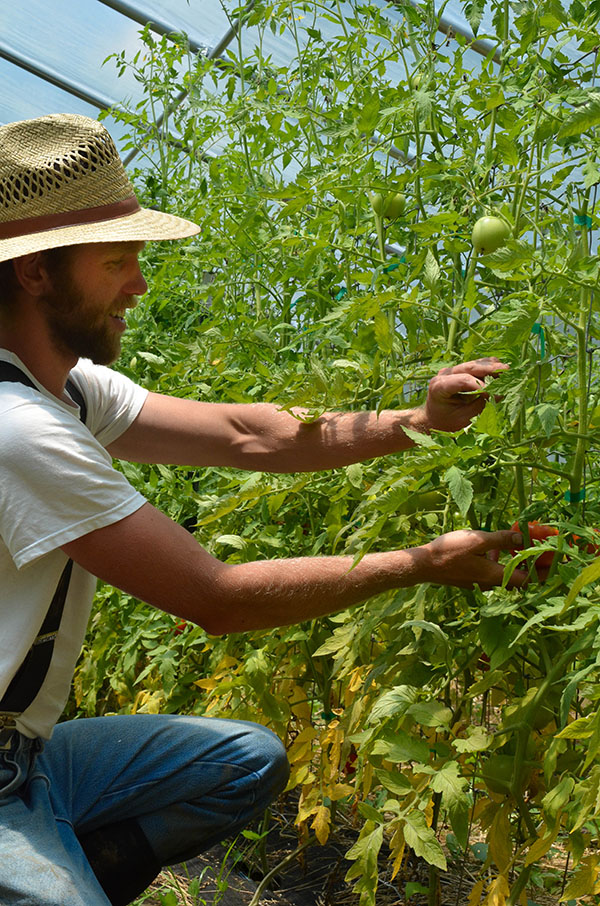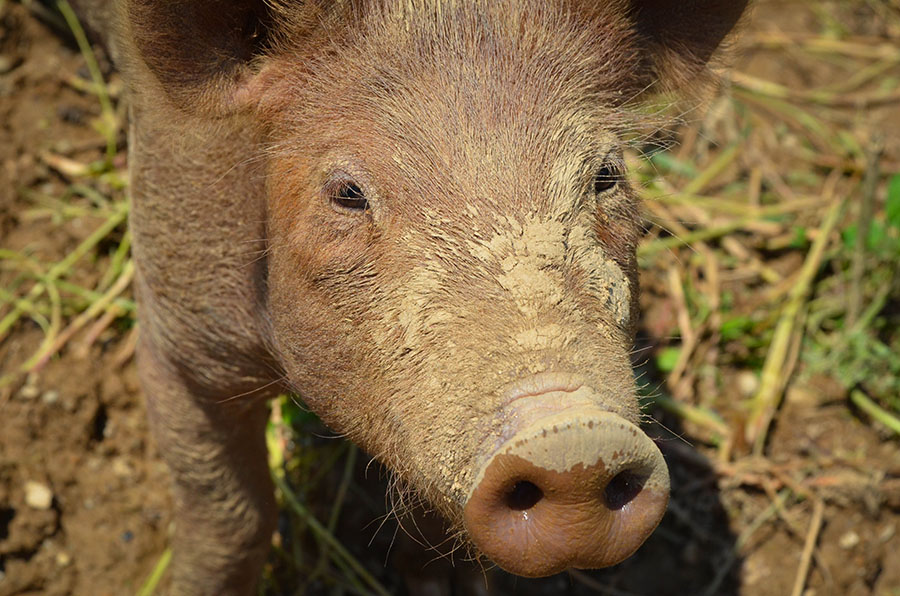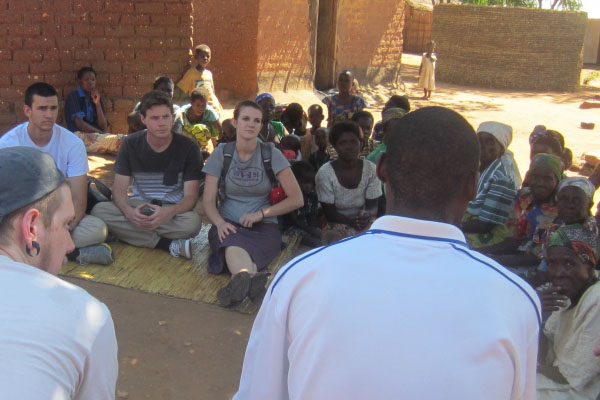Appalachian State University alumnus Cory Bryk '12 fought insurgents in Iraq, but right now his biggest fight is with the rain.
"You're always fighting something and the stress level is high, especially this year," he said, referencing this particular summer, one of the wettest on record for Boone. The water table is so high that water seeps up out of the ground in places where it normally wouldn't—or shouldn't. It's 85 degrees, muggy and muddy, but a break in the clouds finally gives way to the sun.
Six years ago, Bryk traded in his camouflage military uniform for a white T-shirt, jeans, suspenders and straw hat; his combat boots for knee-high rubber waders; and his M-16 rifle for a collection of garden tools.
Bryk joined the United States Marine Corps from his home state of New York in 2003 at the age of 18 and served fours years of duty in a light armored reconnaissance battalion. He deployed to Haiti in 2004 and to Iraq in 2005. As an infantryman, he saw the worst of the Iraq war.
Now, instead of serving in a tight-knit military battalion on the front lines, Bryk is a first-generation farmer who serves his own community, a community that his family relies on for 100 percent of their livelihood.
While Bryk was stationed at Camp Lejeune in Jacksonville, he met his wife, Jenny, a Boone native. They moved to Boone after Bryk's service commitment ended, and now they own and manage New Life Farm. Bryk does most of the work himself, while his wife stays busy with their three children, all under the age of 4. Because of his connections at Appalachian State University, he occasionally has an intern, too.
After returning from Iraq, and before meeting his wife, Bryk said he would load up his car on the weekends and drive from the military base toward the Blue Ridge Mountains. Wherever he ended up at dark, that's where he slept. His goal? Put as many miles between him and the "warrior lifestyle" as possible.
One of his road trips landed him in Deep Gap—in Eustace Conway's driveway at dusk. Bryk read the famous naturalist's biography, "The Last American Man," while on tour in Iraq, and it sparked his interest in the sustainable lifestyle.
Bryk walked up to the famous icon in the middle of a horse-plowed field. It didn't take long for the formalities and introductions to wear off. With the straightforwardness that he's known for, Conway quickly gave Bryk a chore: pick up these rocks and toss them over there, he said.
Bryk would periodically show up on Conway's farm to work and the two built a friendship, and Bryk began to realize something: the more he farmed and worked outside, the more he healed from the psychological wounds of war.
Post traumatic stress disorder
Jenny Bryk walks under the canopy tent where her husband is sitting. She bounces their youngest bleached-blond 16-month-old, Michael, on her hip. She stands for a few minutes and listens to Bryk talk about those wounds.
Post-traumatic stress disorder (PTSD) has made adjusting to civilian life a challenge, Bryk said, and although his physical wounds have healed, the psychological wounds have turned to scars that fade but never go away.
"You still haven't healed from the war," his wife said, before sitting in a green plastic lawn chair across from him. "The healing is taking place on the farm and through the community," she said.
When Bryk finished his service in the military, he wanted to find a profession that was fulfilling and therapeutic. He had to find "a sense of purpose through service." He gets all that from farming, he said. "This isn't a pill, but it's therapeutic."
Bryk would eventually like to work with other veterans and teach them to use farming to help cope with PTSD, he said.
"I know for a fact that a lot of veterans that get out (of the military) and are like, 'What do I do with my skill sets, excluding high-stress, violent occupations?'" Bryk said. "Veterans are seeking a renewed sense of identity and purpose—like when they were in the military. Being a farmer has a very distinct identity with a very clear mission: grow food. And people need food," Bryk said.
The educational foundation: Appalachian State University
After Bryk's service with the Marines, he decided to earn a bachelor's degree. Because of his interest in farming and sustainability, he majored in sustainable development at Appalachian and concentrated on agroecology and sustainable agriculture. Around the same time, Bryk and his wife got married, began their family and started farming for their own needs.
"My wife was raised on good wholesome food and wanted to see that her values of wholesome eating were carried on into our family dynamics," he said. "The most affordable way for us to eat local organic food was for us to grow it ourselves."
Bryk used his Appalachian education to expand beyond the family garden. Within two years, he achieved his goal of serving his community with fresh, quality food while selling New Life Farm products at the local farmers market and to local restaurants.
New Life Farm abides by USDA organic standards since the land is already certified for organic growing, but Bryk doesn't market his products as USDA organic. Instead of being accountable to a government agency, he said he wants his customers to keep him accountable.
"I'm going to grow well because the stuff I'm producing feeds my wife, my kids and my community," Bryk said.
Educating the next generation
For Bryk, the concept of sustainability is meeting the needs of the present without compromising future generations.
"What I hope to get out of this for my children is for them to be down to earth, to have a grip on reality and to know where their food comes from," Bryk said.
"I've brought the next generation into this world, so what am I going to teach them to do? Are they going to be givers or takers? Are they going to be aware that there are two sides of the coin—a system that's hurting our society or the alternative to that? I want to engulf them in this alternative," he said.
While Bryk sits reclined in his own green plastic lawn chair, as if on cue, his blonde-haired, blue-eyed 4-year-old daughter, Cora, wanders out of the sun and under the canopy.
"Cora, where does our food come from?" Bryk asked. Being put on the spot made her too shy to answer, but she had no problem answering him when he asked, "What's your favorite animal?"
"Pigs!" she said.
"What do we get from the pigs?" he asked.
"Bacon!" she said, through a smile.
"What else?"
It took her a few seconds, but then she yelled, "Saushage!" not quite able to pronounce the word, yet.
"That's the reality of our food," Bryk said. "Go to your average kid in the city and they have no idea—to them, bacon comes from a plastic package."
The tractorless farmer
A Marine without a rifle is "useless," according to the U.S. Marine Creed. Bryk certainly isn't useless without a tractor. He makes do the best he can, but these days, a farmer without a tractor makes as much sense as a Marine without a rifle.
It's not uncommon to find Bryk tilling acreage in the moonlight with a 16-inch wide Roto Tiller because of his limited access to a tractor.
"It was backbreaking, inefficient, but the reality is that I have to get stuff planted," he said. "When you get a window of time to till or plant, you have to get it done because you don't know what tomorrow is going to bring."
Sometimes he borrows a tractor from a friend or neighbor, but being reliant at someone else's convenience isn't ideal. Bryk said he has realized that it's time to buy a tractor, and he's in the process of launching an online fundraiser through Kickstarter to help cover the cost.
UPDATE: By early 2014, the Kickstarter campaign successfully raised $28,450 for New Life Farm.
Once a Marine, always a farmer
With as much good that farming does for Bryk, it's still a difficult life. For most of the year, Bryk said he feels like pulling out his hair because of the stress—stress from worrying about too much rain, not enough rain, crop disease or losing livestock to foxes and coyotes. It's always something, he said.
"Then there are those brief moments where you just forget about all that. You get a yield from something—that's when it's satisfying," Bryk said. "To be a good farmer, you have to stick it out. You have to be able to function in spite of hardship. That's also something you do in the military."
The Marine Corps has a saying, "Once a Marine, always a Marine." And although the man is the same, his mission has changed. Instead of "destroying things," Bryk is cultivating new things—the very antithesis of what the military teaches, he said. And despite the stress associated with farming, "creating something tangible like food, that most people really appreciate, it really brings satisfaction."
What do you think?
Share your feedback on this story.
About Appalachian State University
As a premier public institution, Appalachian State University prepares students to lead purposeful lives. App State is one of 17 campuses in the University of North Carolina System, with a national reputation for innovative teaching and opening access to a high-quality, cost-effective education. The university enrolls more than 21,000 students, has a low student-to-faculty ratio and offers more than 150 undergraduate and 80 graduate majors at its Boone and Hickory campuses and through App State Online. Learn more at https://www.appstate.edu.
